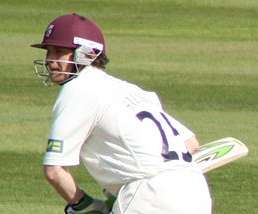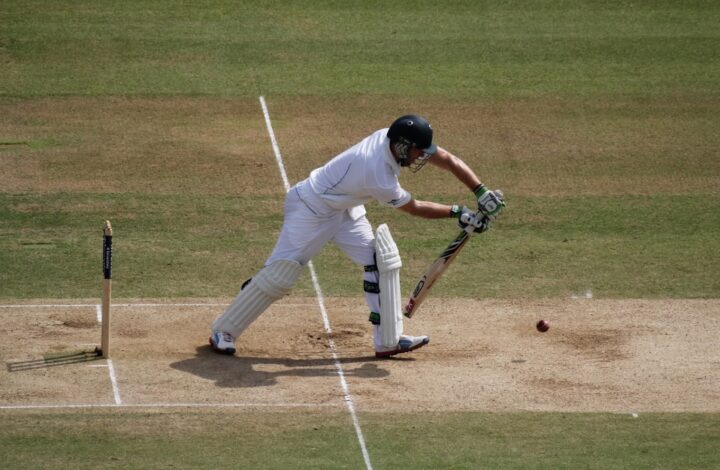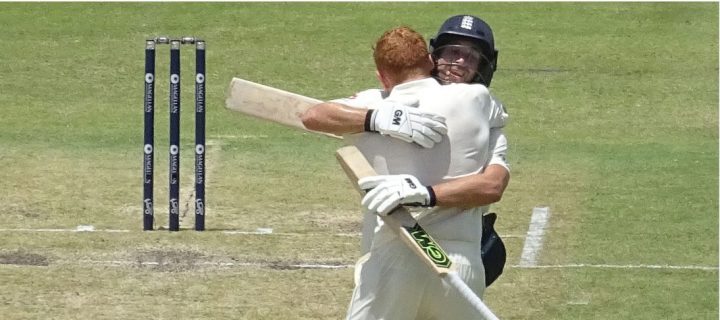Today we welcome new writer Sam Tomkinson to TFT. He’ll be writing a series of articles about fan favourites, forgotten men, or other county players with an interesting history. He kicks things off with a profile of James Hildreth. Is the Somerset stalwart the best batsman never to play for England?
In April 2011, I wrote an article for my university paper previewing England’s Test match summer. The team had just returned from the 2011 World Cup in India – another rollercoaster for our white ball lads – but the red ball team was in much better shape. In fact, they’d just retained the Ashes, on Australian soil, for the first time since 1987.
While supping on a £1.50 snake bite, the only real question was who should fill the number 6 batsman role after the retirement of Paul Collingwood. There were three names in the mix for me: Eoin Morgan (who went on to take the role), Ravi Bopara (who had three Test centuries to his name and offered another bowling option), and James Hildreth of Somerset. The latter had stoically amassed seven centuries in the previous summer and had toured with the EPP during the winter.
At the time, the selection of Morgan seemed vindicated. England went on to win both home series against Sri Lanka and then World No.1 India. Eoin made a respectable 348 runs at an average of 38.66, including a century at Edgbaston versus India as a side act to Sir Alistair Cook’s 294.
However, Morgan’s technique against the red ball – that crab like dip and foot twist more suited to Tiger Tiger than Test cricket – ultimately undermined his Test career. What he did next in ODIs is unarguable but red ball batting has never really been his forte. Therefore, by the summer of 2012, England were searching for a new number 6 again.
The focus now turns to our protagonist, James Hildreth of Somerset – a man who has regularly surpassed 1,000 runs a season in division one of the county championship; a man whose calm presence and cricketing nous are somewhat reminiscent of (an older) Kane Williamson. Hildreth had missed his chance in 2011 but at the age of 27 there would surely be more opportunities.
So Hildreth waited. And he waited some more. But the Test call up never came.
In 2015, Hildreth enjoyed another hugely successful season. He amassed 1,390 runs at an average of 53.46 to become the leading run scorer in England. However, a couple of fiery headed middle order batsman were establishing themselves in the England side instead: Jonny Bairstow and Ben Stokes, with their expansive play and youthful exuberance, were the preferred options at the time.
Ben Stokes’ all action approach and multi-dimensional facets made him stand out immediately. Meanwhile, Bairstow had been dismantling attacks for a couple of seasons and warranted his international selection too. However, was Bairstow the right option in hindsight? After all, he has a modest Test return (compared to his white ball prowess) and a technique that makes an in-swing bowler’s eyes pop out like a Disney cartoon. Perhaps Hildreth would’ve proved a wiser investment?
The Somerset man continued his fine form in 2016. He passed 1,000 championship runs yet again. However, he was now comfortably into his 30s and some might have considered selecting a thirty-something for England to be a regressive move. With his England hopes apparently dashed, two sub-par seasons followed and he disappeared from the international conversation – this time for good.

One wonders whether the COVID-19 crisis might just offer a glimmer of hope for Hildreth though. England are set to name a large squad of approximately 45 players for the international fixtures this summer. There will be a white ball squad and a Test squad. No player will appear in both squads at the same time. Could this open the door for fringe players or, in Hildreth’s case, a forgotten man to finally earn a call up?
Sadly I feel that the answer is no. And if it does happen then it will be far too late. Consequently I’d like to focus on why Hildreth has been ignored by successive selection regimes for so long.
Were there always better players ahead of him? I’d argue not. Hildreth’s domestic record is very good. It’s far superior to Morgan’s and about the same as Bairstow’s. Hildreth averages 42.5 for Somerset with a whopping 46 hundreds. Jonny averages 43.5 for Yorkshire with 24 hundreds. Meanwhile, England have given opportunities to plenty of batsmen with inferior county records. James Vince, for example, has played 13 Tests despite averaging under 40 for Hants.
Some argue that Hildreth has been ignored because he plays for Somerset rather than a county with a Test ground. Had he played for Yorkshire, for example, then he might have had an advantage. This is a constant grumble by supporters of smaller counties who believe they’re given a raw deal. Perhaps, but there have been enough cases to counter this – Zak Crawley, for example.
Interestingly it has been mentioned that Hildreth has shown frailties against the short ball. Having watched him face Fidel Edwards on a green top, his open stance might indeed be vulnerable to good test match bowling. Perhaps his time with the England Lions revealed a deficiency there?
There have also been accusations that Hildreth isn’t hungry enough. His decision to turn down the Somerset captaincy when Marcus Trescothick stepped aside certainly added fuel to this particular fire. Or was his softer demeanour – in comparison to the likes of Bairstow and Stokes – interpreted as a sign of weakness? Did the England camp perceive him as timid rather than calm? Looking at the fallout of the 2013/14 Ashes tour down under one wonders whether he might’ve been eaten alive in that particular England dressing room.
My own theory is that while Hildreth is certainly one for the purists, the selectors didn’t feel he was in line with the modern cricketer. Not as aesthetically pleasing as an Ollie Pope, or as crowd pleasing as a Jos Buttler, Hildreth could be seen as a mere accumulator in comparison. He certainly bats like a good old fashioned cricketer – even though he was more of a dasher early in his career.
Although Hildreth’s innings meander with serenity, one wonders whether this will bring the crowds in. Neither the casual fan nor inspiring child would laud Hildreth’s ability to rotate the strike and pick up 2s. There’s obviously nothing wrong this approach,of course, but England’s current chairman of selectors probably wants something more futuristic from his middle-order players.
Consequently, one wonders whether the timing has ever been quite right for Hildreth. England’s top 5 were so dominant back in 2011 that a more cavalier number 6 seemed logical at the time. And then, after the World Cup shambles in 2015, England were again searching for more modern and free scoring cricketers.
Whether the selectors’ approach was the right one is obviously open to debate. The white ball game is cyclical. New rules and ideas add new dimensions to the game. Test matches, on the other hand, haven’t changed anywhere near as much. The way to win is the same as it’s been for donkeys years – bat time, occupy the crease, and cash in later in the day.
Hildreth can therefore count himself extremely unlucky. Despite his solid white ball record, England’s selectors have always searched for sexier picks. They had no time for an evergreen batsman from a bygone era. It’s only now, when it’s too late for Hildreth, that the selectors are beginning to see the error of their ways.
One wonders what might have been for the forgotten man of English cricket.
Sam Tomkinson








James Hildreth has been very unlucky not to play for his country, but I would have to say that a call up that this stage would be retrograde, and would also be grossly unfair to Hildreth since it would be all too likely to give him an England batting record along the lines of Alan Wells, who was picked in the twilight of a very long career (and, unforgivably in my opinion, for the last test of the home season, which gave him approximately a 0% chance of securing a place in the winter tour party). Occasionally guys selected late in their careers have done surprisingly well, notably David Steele and Clive Radley, both well past 30 when the opportunity came their way, but by and large selecting people who have not played at that level before so late on in their careers is not to be recommended.
He’s not the forgotten man for me as when I used to play cricket PC games he was the proverbial pain in the bum to get out in county games. I guess Eidos, the manufacturers, has a Somerset man on their programming team.
I think you could make a case for any county having a ‘forgotten man’ in their ranks. Hildreth certainly fits the bill for Somerset. I can’t see in the modern game a David Steele emerging from the ranks.
Age didn’t count against Denly but he was willing to bat in the top three where Engl;and had vacancies rather than at Nos. 4-6 where there have been none in the last 5 years. Not being Ed Smith’s mate who helped him out with a dressing room mutiny when everyone else loathed his captaincy probably didn’t help his cause either.
My favourite bit of selectorial double-think came a couple of seasons ago when Angus Fraser was bleating about how awful a Somerset pitch was – while still not selecting Hildreth who’d made a century on it.
Meanwhile the ex-CEO of the IPL wants it expanded to 10 weeks. See where this is going?
Just a note about a decent article in this month’s Cricketer magazine detailing the effects of the virus on all levels of the game world wide. It’s one of the most comprehensive I’ve read and only makes you more frustrated that there appears to be no general global strategy to combat it. Statistics appear relatively meaningless and the more ‘experts’ get involved the more confusion reigns. At least cricket seems to be presenting a pretty united front compared to other sports.
Good piece. No doubt Hildreth deserved a crack but I suppose the ultimate question is whether England have been worse off for not picking him.
Excellent article. I tend to agree that Hildreth is a bit unlucky not to have played for England – and the county he played for was a factor. Not because Taunton isn’t a Test ground, but because at the time it had a reputation as a featherbed where runs were too easy to come by.
Taunton often gets criticised for spinning too much. So it’s surprising that Hildreth hasn’t been picked for a tour of India / Sri Lanka or the UAE at some point. We’ve always lacked batsmen who are used to spinning surfaces.
Taunton for most of the time Hildreth was batting on it was known as a batsman’s paradise. It was turned into a spinning pitch fairly recently. That must have been a major consideration. Headingley by contrast has always been challenging though not as much as Durham’s Riverside.
Every generation there are players whose faces just do not fit. It has nothing to do with cricketing ability. Think back to the 90s when Roger Twose could not even get into an England A squad and then went on to become world ranked 2 in white ball for NZ. Fortunately he was young enough to emigrate and start over. But I certainly think there is something about the personality issue which contributes. Hildreth is not a motor mouth, or an entitled posh boy or a media darling (all factors which have explained some past selections) and the same effect can be seen with others. Chris Woakes, possibly the most self-effacing member of the current squad, had to wait at least 3 years beyond when he should have debuted in tests and has always been the first to get dropped, even after performing well. The problem lies with the selectors, not the player.
That’s both David Lloyd and Michael Vaughan on record as advocating a 10 game CC season. This happens to be the consequnce of the otherwise benign-sounding three-leagues-of-six model for the CC.
The implications for the earnings of a player like Hildreth would be drastic – and thus for the game’s chances of producing more Hildreths. That both Lloyd and especially Vaughan were mediocre limited overs’ players and seeking to smash the ladder they climbed up on themselves is particularly nauseating.
Meanwhile, watch out for the BCCI lifting their ban on Indian players playing in overseas’ franchises (which are or soon will be Indian-owned anyway). There are definite rumblings things are moving in that direction.
You would hope, if there are ever to be English franchises which can be foreign owned, that the ECB will apply (a somewhat more effective) fit and proper person test as exists in football. Who knows how team owners like the Porno Twins at West Ham ever passed such a test – but their misdeeds pale into insignificance next to the activities of some franchise owners in the IPL.
Very astute; couldn’t agree more. It’s nauseating and hypocritical how former players, on joining the media, feel the need to ‘slag off’ and denigrate the championship, a form of cricket that developed them, as well as giving opportunities for many others in the future.
You should also include Strauss in those former players who seem to forget how they arrived at becoming test match players.
James Hildreth is one ‘forgotten man’ who will be remembered a damn sight longer around Somerset than most recent England players will be by their counties.
Hildreth has suffered, along with a few others, because he is playing in an era when we lack top three batsmen and have a plethora of middle order players competing for a position. This is exaggerated because we have a captain and seriously good player (Root) who bats at 4 and a once in a generation allrounder (Stokes)at 5/6 meaning realistically there is only one middle order place available – this has resulted in many batsmen being played out of position (Root, Bairstow, Pope, Westley, Balance, etc.)
Yes Hildreth has been extremely unlucky not to have an opportunity – IMO definitely in 2011, Morgan was the “press” pick. In 2015 Bairstow was a must, he was chewing up CC attacks. Timing has killed his chances.
Great and informative writing Sam. I fear he is one of the many ‘forgotten men’ over the years. What, if, only etc ? The fact remains that you can only select a team of eleven so some will always miss out? And who would want to be an international selector? Not me ! Colin Fry.
Some chance to tell the ECB what you think of them here:
https://www.cricketsupporters.com/have-your-say/
Nice article, and well presented angle. Certainly, any player needs to be made of sturdy stuff in order to enter today’s searing cricket arena. But I think you may have hit on something, Sam – the fact that Hildreth was perhaps simply born at the wrong time. Looking down the kaleidoscope and weighing up all the variables, requirements and options available, it is conceivable that there was not a place for a player of Hildreth’s style, character and temperament at that moment in that team. Despite his rock solid stats. A cricketer for other times?